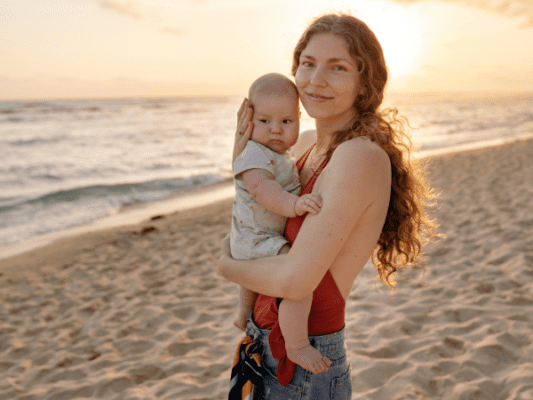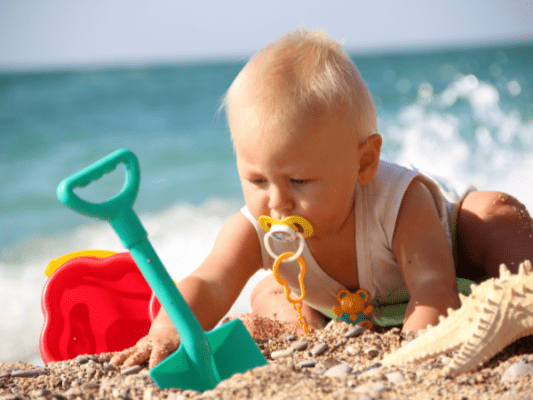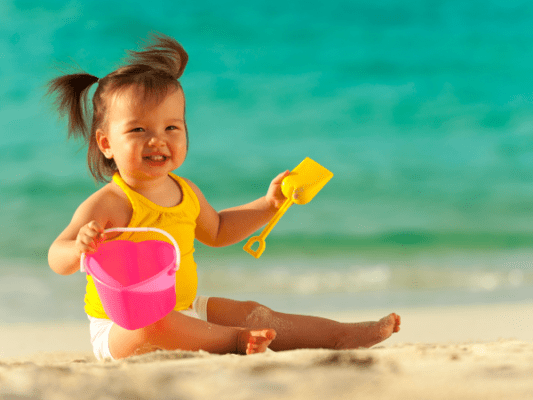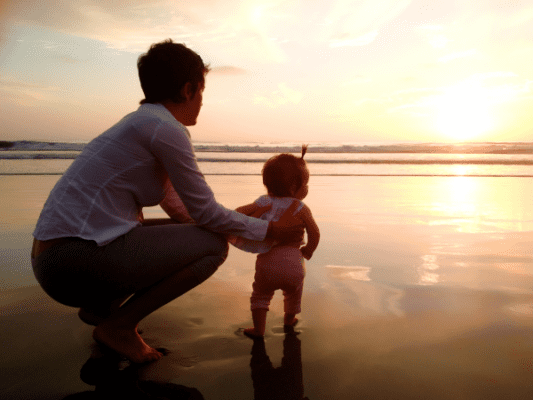Taking your little one to the beach for the first time can be an exciting moment to create memories with the newest addition to the family. However, bringing your baby on any vacation has many more considerations than one might think.
Although it may be daunting as a new parent to take your little one to a new space – with the correct information and preparation, you can enjoy the special moment without hassle or worry! So at what age can I take my baby to the beach?

Can You Take Newborn To The Beach?
There are no hard and fast rules about taking newborns to the beach. So, it is purely a matter of when you feel it is time. Indeed, at least one woman chose to give birth in the ocean. (Although that’s not generally recommended!)
In the very first few weeks of giving birth, you will probably be exhausted and need rest. While going to the beach can sound like a relaxing thing to do, as a new mom, it can be a stressful event, and you may find yourself worrying over many small things.
It is important to wait until you have recovered fully from birth and feel comfortable before heading down to the beach with your baby. Give yourself as much time as you need before considering a beach outing.
What Age Can I Take My Baby To The Beach Safely?
Although in theory you could take your baby to the beach as soon as mom is ready to start moving around, most pediatricians recommend waiting until your baby is around four to six months old .
So why wait? One reason is that babies under six months should not sit in cool water for lengthy periods. Babies cannot regulate their body temperature as well as adults, and they can lose body heat very quickly if they stay in cool water for an extended period of time.

Although six months old’s can regulate body temperature better than younger ones, they still cannot control their temperature as well as we adults. Therefore, ensure your little one does not stay in the water too long. Then, when it is time to get out of the water, make sure you dry them immediately and warm them with skin-to-skin contact or warm clothing/blankets.
Furthermore, this age is a good time to introduce your baby to the ocean since they can hold their head up (which commonly happens around this age). If you want to stand in the sea with your baby in your arms, it is safest to wait for them to have stability in their neck, as the constant push and pull of the ocean could injure them if they lack this stability.
What Are The Safety Concerns With Taking A Baby To The Beach?
Now that you’re ready to head down to the beach, it is a good idea to know some simple safety rules to ensure you and your baby are happy and secure. The beach can be a relaxing experience, and we want to try our best to keep it that way.
There are two things to consider in terms of being safe on the beach: water and sun safety.

Water Safety
When it comes to water safety for kids, you need to remember the following safety tips:
- Shallows
- Life jackets
- Preventing water swallowing
- Facing the water
- Touch supervision
Shallows: The first rule to ensuring that your baby, toddler, or child is safe in or around the ocean is to strictly enforce staying in the shallows. Toddlers love to run towards the waves, and this can be extremely unsafe as a wave can quickly sweep them off their feet. Keep babies in the shallows at all times.
Life Jackets: For your peace of mind, one of the best things you can do is buy your little one some type of flotation device. You can find a wide variety of floating suits for kids of all ages (we have some recommendations). Tip: test the floating device beforehand to ensure that it has the right buoyancy to keep your little one afloat. Also, remember that a flotation device is an aid, but it cannot replace adult supervision
Preventing water swallowing: When taking your baby or toddler into the ocean, a few splashes of the waves may cause them to swallow some of the water. While a small amount is fine, it is best to prevent this. Babies, especially very young ones, have weak immune systems, so any bacteria floating in the water could cause sickness if swallowed.
Facing the water: One thing to teach your little ones from the moment they engage with the ocean is to always face the ocean and not turn their back on it. From a young age, children should learn this rule so that no waves catch them off guard and knock them over, which could lead to an array of problems.
Touch Supervision: As your toddler gets older, they may start wading into the water a little deeper. As a parent, it is best to teach your children to stay one arm’s length away from you. Should any problem arise, you can grab them in a second.
Sun Safety
As mentioned, little ones, especially very young children, have issues regulating body temperature. This means that keeping them safe from the sun is vital.
The best thing you can do is prevent taking your baby or toddler to the beach during the hottest points in the day. Try to avoid the beach between 10 in the morning and 2 in the afternoon. However, if your baby is younger than six months, it is best to avoid the sun entirely and keep them in the shade, if possible.
Last but certainly not least is to cover your little ones (older than six months) with sunscreen and reapply at least every 20 minutes.
What About Sunscreen For Babies?
Most experts agree that babies younger than six months old should not wear sunscreen. It is recommended to only apply sunscreen to babies that are six months and older because babies are at a high risk of experiencing side effects from sunscreen, such as a rash.
If your baby is younger than six months, then the best you can do is keep the little one in full shade. An SPF of 30 or higher is recommended for babies six months and older. (For more tips, check out our post on keeping mosquitoes away from babies.)

Taking Baby To Beach Tips
Now that you’re all set to go to the beach and have your baby essentials all packed, there are always some last-minute tips that can help you have the perfect day with your family.
- Prepare your family beach bag a few hours before – we all know how chaotic it can get when trying to get the whole family out of the house.
- Look out for signs of dehydration: excessive crying, redness in the face and on the body.
- Frequently hydrate your little ones with breast milk or formula. If your baby is six months or older, you can give them a small amount of water – no more than 4 ounces in a day.
- When your baby goes in the sun, place on a sun hat and sunglasses – protecting those small new eyes is essential!
Closing Thoughts
It’s safe to take your baby to the beach as long as you take the proper precautions, like reducing sun exposure and implementing water safety. It comes down to your comfort level and what works best for your family.


